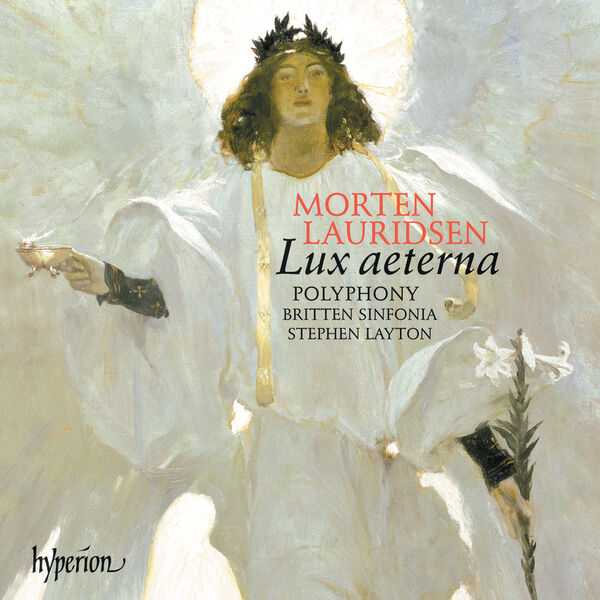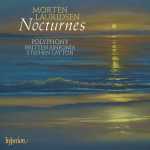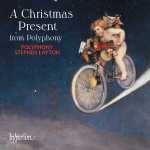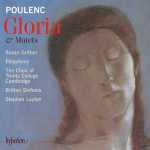
Composer: Morten Lauridsen
Performer: Polyphony
Orchestra: Britten Sinfonia
Conductor: Stephen Layton
Format: FLAC (tracks)
Label: Hyperion
Catalogue: CDA67449
Release: 2005
Size: 232 MB
Recovery: +3%
Scan: yes
Lux aeterna
01. I. Introitus
02. II. In te, Domine, speravi
03. III. O nata lux
04. IV. Veni, Sancte Spiritus
05. V. Agnus Dei – Lux aeterna
Madrigali – Six ‘Fire Songs’ on Italian Renaissance Poems
06. I. Ov’è, lass’, il bel viso?
07. II. Quando son più lontan
08. III. Amor, io sento l’alma
09. IV. Io piango
10. V. Luci serene e chiare
11. VI. Se per havervi, oime
12. Ave Maria
13. Ubi caritas et amor
14. O magnum mysterium
This new disc from the multi-award-winning choir Polyphony is something rather special. At once genuinely original and yet reassuringly accessible, the music of Morten Lauridsen has achieved something of a cult status in his native America (O magnum mysterium currently being the top-selling choral octavo in the country the number 2 spot is also a Lauridsen work), and Stephen Layton draws from his musicians some of the most ardently lyrical performances of recent years. Lux aeterna was greeted by The Times after its London premiere thus: a classic of new American choral writing in this light-filled continuum of sacred texts, old world structures and new world spirit intertwine in a cunningly written score, at once sensuous and spare. Were a comparison to be sought, it would perhaps with with Faures Requiem, but this new work surely stands as unique. The Madrigali, subtitled Six Fire Songs on Italian Renaissance Poems, are phenomenally challenging unaccompanied choral works, very much in the tradition of Monteverdi and Gesualdo. Yet the technical difficulties they present to the performer are disguised from the listener by a seamless sense of purpose which unites the cycle into a whole of stunning effect. Occupying a similarly opulent sound-world to Lux aeterna, the three Latin motets which conclude this disc are truly modern masterpieces in the traditional motet genre.
Despite the wide geographical separation between the music’s point of origin and that of the performers — Morten Lauridsen is based in southern California, while Polyphony and its conductor Stephen Layton are as English as they come, with a profound knowledge of the acoustic qualities of London’s churches — this disc represents an ideal match of music to performing forces. Polyphony has specialized in the accessible sort of contemporary choral music, with a warm sound attuned to the ethos of reassurance yet a deliberate precision that builds up long lines and inflects them strongly when necessary. They give definitive performances of a pair of ambitious and sharply contrasting pieces by Lauridsen, both of which have been well recorded in the past but which have never been so nicely addressed to one another.
Lux aeterna (1997) is a work made up of five different liturgical texts, beginning with the Introit from the requiem mass (“Requiem aeternam dona eis, Domine: et lux perpetua luceat eis”) and ending with the Agnus Dei from the Mass Ordinary. It is filled with the trademark sounds of this composer, who uses too much dissonance to be brought under the minimalist umbrella but who creates full, lush textures using a relatively restricted (or at least slowly evolving) palette of harmonies and thus makes music with a contemporary kind of calming resonance. Lux aeterna, for chorus and orchestra, brings the Britten Sinfonia on board; Layton balances all his forces precisely in the splendid environment of St.-Jude-on-the-Hill in London’s Hampstead Garden Suburb. The work is complemented by the inclusion of three shorter a cappella Lauridsen pieces in the same vein.
In sharp contrast stand the composer’s Madrigali: Six ‘Fire Songs’ on Italian Renaissance Poems of 1987. Here Lauridsen attempts with some success to forge a modern language extended from the madrigals of Gesualdo and Monteverdi. Sharp dissonances are developed out of a single core sonority and build to a moment of supreme tension in the fourth piece, “Io piango” (I weep). In this work, too, Polyphony (now performing in London’s Temple Church) remains firmly in control.
Lauridsen has admirers on both sides of the Atlantic. They, and indeed any general lover of choral music, will enjoy this disc. If you sing in a choir, check this recording out to learn just how good choral singing can get. Hyperion’s engineers, working on what might be termed their home turf, have delivered this event in full fidelity.



